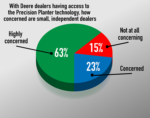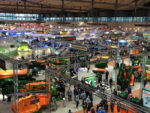Advertise Follow Us
From the Virtual Terminal
From the Virtual Terminal
Flying Blind Could Cost You and Your Customers
While the skies aren't completely clear for use of UAVs in agriculture, recent indicators show that the industry may be preparing for takeoff.
Read More
ID That Connector
An Overview of the Weather-Pack Series
As we continue this series, another connector I felt would be easy to find is the Weather-Pack series. These have been around for years in all types of applications. They are still very popular.
Read More







![[Technology Corner] Helping Your Customers Determine Which Technology is Right for Them](https://www.precisionfarmingdealer.com/ext/resources/2025/03/26/Helping-Your-Customers-Determine-Which-Technology-is-Right-for-Them.png?height=290&t=1743084621&width=400)


